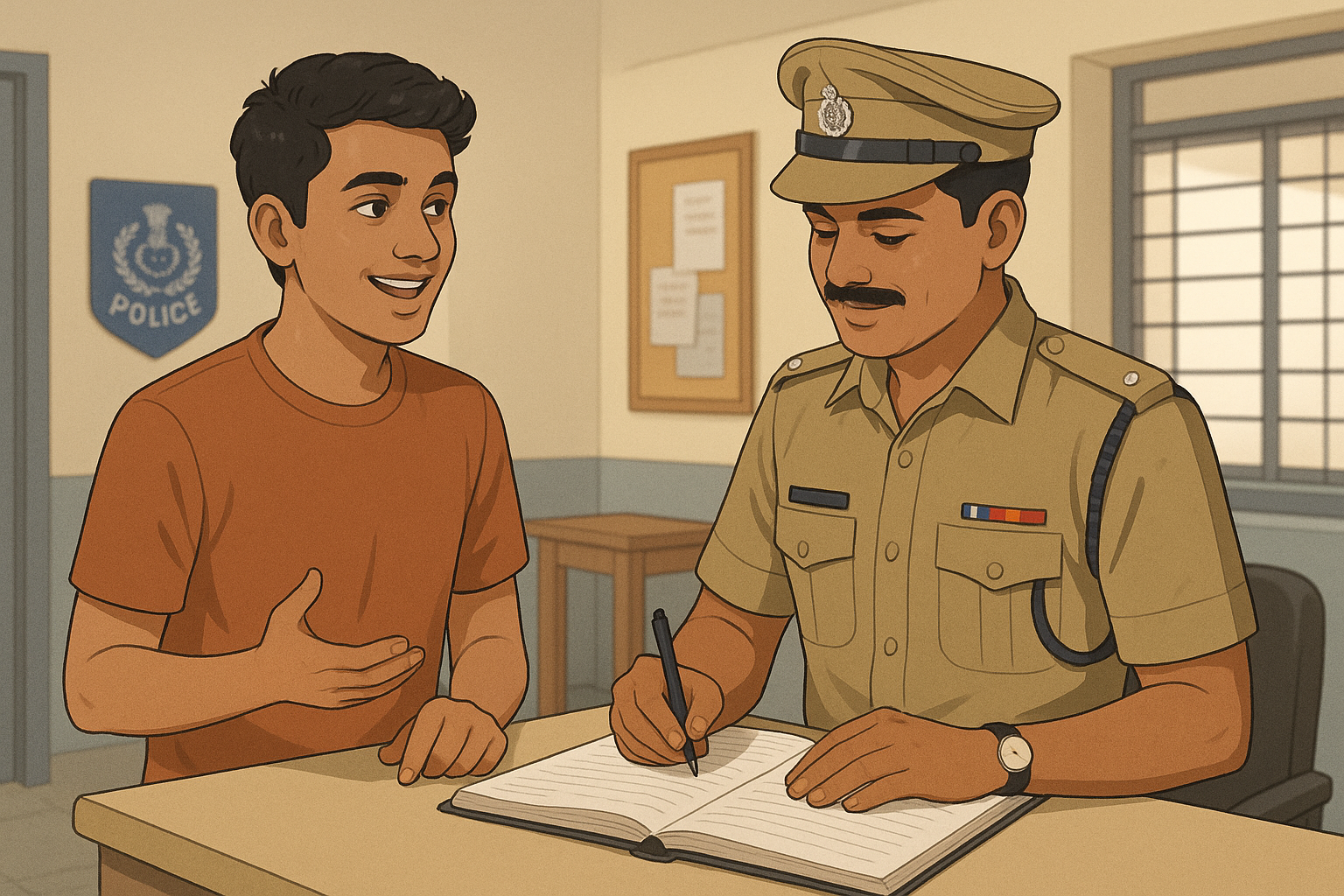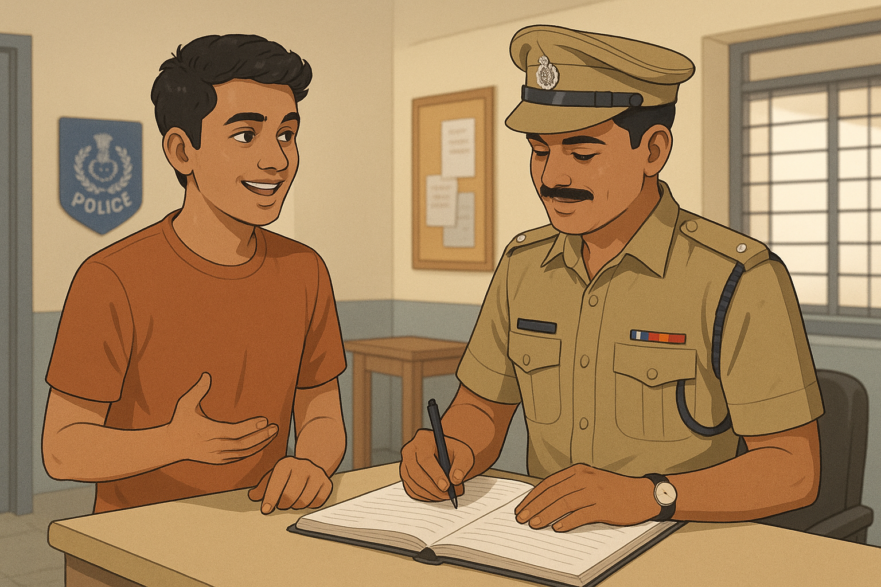
📜 How to File a Complaint or FIR in India – Step-by-Step Guide
“The pen that writes the First Information Report may decide the course of justice.”
Whether you’ve lost your wallet, witnessed an accident, or faced harassment, knowing how to file a complaint or FIR (First Information Report) is essential. Many citizens, especially students, feel anxious about approaching a police station — but understanding the process can empower you to act confidently when it matters most.
⚖️ What Exactly Is an FIR?
An FIR (First Information Report) is the first document prepared by the police when they receive information about a cognizable offence — that is, a crime where police can arrest without a warrant and start investigation immediately (like theft, assault, or murder).
The FIR records the details of the offence, the accused (if known), witnesses, and other relevant facts. It’s an essential step because it officially begins the criminal investigation process.
📚 Legal Foundation
The FIR process is governed by Section 154 of the Criminal Procedure Code, 1973. It clearly states that when information about a cognizable offence is given to an officer in charge of a police station, it must be written down, read over to the informant, and signed by them.
🧭 Step-by-Step Guide: How to File an FIR in India
Step 1️⃣ – Go to the Right Police Station
Visit the police station that has jurisdiction over the area where the offence occurred. For example, if your phone was stolen in Connaught Place, you must go to the Connaught Place Police Station in Delhi.
In case you are unsure of the exact station, you can approach any station — your complaint will be redirected to the correct one.
Step 2️⃣ – Provide the Information
Explain the incident clearly to the officer-in-charge. Include:
- Date, time, and location of the incident
- Names and descriptions of people involved (if known)
- Witnesses, if any
- Any material evidence (photos, messages, documents, etc.)
Don’t worry about legal language — speak in your own words. The officer will record the details formally.
Step 3️⃣ – Ensure the Report Is Written Accurately
Once the details are written, the officer will read the report aloud. Carefully check that all facts are correct — you have the right to demand corrections before signing it.
Step 4️⃣ – Get a Copy of the FIR
After signing, ask for a copy of the FIR. Under the law, this copy must be given to you free of cost. This document is crucial — it’s your official proof that the complaint has been registered.
Step 5️⃣ – Follow Up
After registration, the investigation begins. You can ask for the name and contact details of the Investigating Officer (I.O.). Keep track of the FIR number and check the status periodically — either by visiting the station or online.
🔍 Difference Between a Complaint and an FIR
- Complaint: Can be made to a Magistrate or police for any offence (cognizable or not).
- FIR: Specifically for cognizable offences and filed with the police to start investigation.
For minor or non-cognizable offences (like public nuisance or defamation), you may need to file a written complaint before a Magistrate under Section 190 CrPC.
🚫 What If Police Refuse to File Your FIR?
Unfortunately, this happens sometimes. But you have clear legal remedies:
- Approach the Superintendent of Police under Section 154(3) CrPC with a written complaint.
- Send your complaint by registered post to senior police officials.
- If there’s still no action, you can approach the Judicial Magistrate under Section 156(3) CrPC to direct the police to register an FIR.
🧩 Important Tips When Filing an FIR
- Always remain calm and respectful at the station.
- Carry an ID proof and any evidence you may have.
- Ask for the officer’s name and designation for reference.
- Note down the FIR number and date for tracking purposes.
- Keep photocopies or digital copies of all documents submitted.
🕰️ How Long Does It Take?
The FIR registration itself usually takes a few minutes once your statement is recorded. However, the investigation timeline depends on the nature and complexity of the case. For simple thefts or lost items, closure reports can take a few weeks; for serious crimes, it may extend longer.
📜 Historical Insight: The Evolution of the FIR
Before independence, there was little accountability for how police recorded crimes. The British administrative reforms introduced the idea of a written record — the FIR — to ensure transparency. After independence, the concept was retained in the 1973 CrPC, reinforcing the citizen’s right to have their complaint formally documented.
Over time, courts have expanded the scope of FIR rights — making it not just a procedural formality but a safeguard for justice. The FIR today represents a citizen’s voice, officially acknowledged by the state.
📘 Frequently Asked Questions (FAQs)
1️⃣ Can I file an FIR online?
Yes, most states allow online FIRs for non-cognizable offences or lost documents. Visit your state police’s official website for details.
2️⃣ Can someone else file an FIR on my behalf?
Absolutely. Anyone with knowledge of the incident can file an FIR — not just the victim.
3️⃣ What if the information later turns out false?
If it was given in good faith, there’s no penalty. However, knowingly filing a false FIR is a punishable offence under Section 182 IPC.
4️⃣ Can I withdraw my FIR later?
Once filed, an FIR cannot be “withdrawn,” but the case can be compounded (settled) for certain offences with court permission.
5️⃣ Is there a time limit to file an FIR?
There’s no strict deadline, but delays should be explained. The sooner you report, the stronger your case.
🧠 Final Thoughts
Filing an FIR isn’t as daunting as it seems. It’s a crucial first step in seeking justice — a tool that ensures your voice is formally recorded and acted upon. Understanding your rights, the process, and the law’s history behind it will not only help you in exams but also empower you as a responsible citizen.
📘 Free Study Material for Judiciary Aspirants!
Download our FREE study material prepared by Delhi Law Academy’s expert faculty.
Contact us
📍 Delhi Law Academy – Jaipur Branch
6C, Tower 2, Coaching Hub, Pratap Nagar, Jaipur – 302033
📞 Phone:
+91 9911916552
+91 8447285606
✉️ Email:
contactus@delhilawacademy.com

